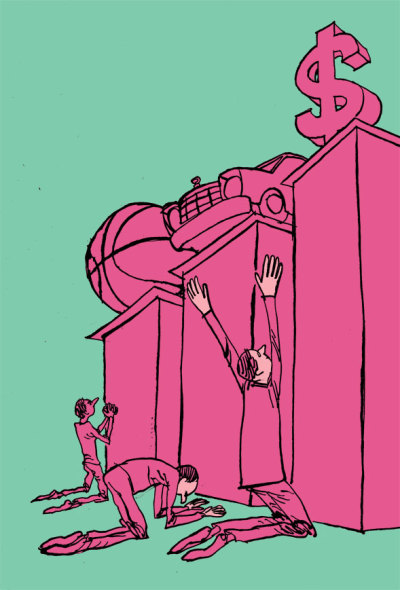The 1 thing keeping your sin on life support

If there’s one thing you can say about America, it’s that most of us are addicts.
According to a U.S. News and World Report article, two-thirds of Americans admit to having some form of addiction, with that number most likely being higher. Addiction ensnares people no matter who they are or where they live with the U.S. News article expert saying, “I think what we're seeing in this is that it's not isolated … It's pretty surprising to think about how pervasive of a problem it is in the U.S ... There isn't a typical person with addiction problems. It seems like it's affecting families regardless of their race and ethnicity, regardless of their income and regardless of where they live”.
Addictions take many forms. You have the common substance-related ones like alcohol, drugs, tobacco, etc., and then a long list of non-substance addictions such as pornography, internet/social media, gambling, work, shopping, sex, food, and exercise.
What’s common about these addictions is their commanding, compulsive nature. To use a double negative, people describe how they “can’t not do” .
Is that you? Are there destructive habits that you “can’t not do”?
If so, barring the physical aspect that can occur with some addictions, the Bible says that what you have is a spiritual battle with sin and that any compulsion can almost always be traced back to one thing. Kill it and you kill your addiction.
A right desire vs. an ‘overdesire’
Webster defines addiction as “a strong inclination to do, use, or indulge in something repeatedly” with the “activity having harmful physical, psychological, or social effects”. St. Augustine describes this feeling well in the introduction of his Confessions’ third book where he says: “a cauldron of unholy loves sang all about my ears.”
That’s a pretty good way to put it, don’t you think?
Augustine had studied Cicero’s Hortensius where Cicero said that every person “sets out to be happy [but] the majority are thoroughly wretched.” This and other learnings led Augustine to conclude that such “wretchedness” is often the result of what he called disordered loves.
Scripture talks about disordered and “unholy loves” in many places, and if you have a fairly worn-out Bible, I’m sure you know the list of them. But here’s what took me a while to figure out: any love can turn into an unholy love.
The term used in the New Testament to describe this kind of heart-tug is epithumeó (e.g., Gal. 5:16), with the English word used to translate it — “desire” — falling short in conveying its real meaning. The word literally means a “great” or “over” desire for something. It communicates an excess, immoderation, and overindulgence even with supposedly good things.
Work. Food. Sex. Social Media. It’s perfectly fine to have a level-hearted desire for any of those. But when they become an obsessive compulsion that overtakes us in a dictatorial fashion, then they’ve become an “overdesire.” They’re not a sinful longing for something bad in the sense we usually think of sin, but an “overdesire” for something good. And when we nurture those, they morph into something worse.
They become an idol.
Ever wonder why you can’t shake some sins and what keeps them energized in your Christian life? It’s idolatry — the first two “Thou shall not’s” in the Ten Commandments.
Tim Keller says, “When you feel like you have to sin, look for the chain of the idol.” The chain Keller references is the life support line feeding your sin issue.
This can sound odd to some people because we can get confused over what an idol is, with many thinking it’s only some sort of prehistoric-fashioned god out of metal or wood. While that’s not common anymore in the civilized world, what is widespread is idolatry’s form which is more insidious and invisible to the naked eye.
In his sermon on idolatry, Dr. Martyn Lloyd-Jones unmasks an idol’s true identity when he says, “An idol is anything in our lives that occupies the place that should be occupied by God alone … Anything that holds a controlling position in my life is an idol.”
So again, ask yourself: do you have a destructive habit that you “can’t not do”? Something that’s holding a “controlling position” in your life?
Say hello to your idol.
Almost anything can turn into an idol. For example, the writer Augusto Del Noce saw how a worldview can quickly turn into idolatry. Referencing his critique on Marxism, Wall Street Journal writer Francis Maier said Del Noce observed that “humans have a bottomless appetite for building heaven on earth, and that we therefore have the unhappy habit of turning our ideas and our tools into objects of obsession and then worship. He knew that idolatry kills.”
That being true, instead of our idols killing us, how do we go about killing them?
Martyn Lloyd-Jones gives some good advice when he says the first step is recognizing your idol: “I must remember the true nature of idols. That is the way to avoid worshipping them and a very good way of guarding yourself against idolatry. Just look and consider what they are.”
And how do we practically do that? Lloyd-Jones continues: “Look at the things to which we tend to give our worship and our adoration. Even if we put them at their highest and their best, are they worthy of it? Is there anything in this world of time which is worthy of our worship and our devotion? We know full well there is not.”
Next, we need to recognize the pathetic impotence of our idols. We turn to idols (manifesting as addictions) because we believe they bring us comfort and deliverance from whatever temporal misery we’re experiencing. But in life’s big moments, they all fall short of real, long-lasting liberation.
This is why God says mockingly to idolaters: “When you cry out, let your collection of idols deliver you. But the wind will carry all of them up, and a breath will take them away” (Is. 57:13). That’s why we should obey the 1st and 2nd commandments and stick with God instead.
When we do, it makes us immune to almost any addiction’s wink and content with whatever comes our way. As John Newton said, when we understand the Gospel, our future glory, and steer clear of idols, we arrive at a place where “the best times are leaveable and the worst times are bearable”.
In other words, you have the hard-to-get-and-keep presence of real peace. And who doesn’t want that?
Robin Schumacher is an accomplished software executive and Christian apologist who has written many articles, authored and contributed to several Christian books, appeared on nationally syndicated radio programs, and presented at apologetic events. He holds a BS in Business, Master's in Christian apologetics and a Ph.D. in New Testament. His latest book is, A Confident Faith: Winning people to Christ with the apologetics of the Apostle Paul.



























